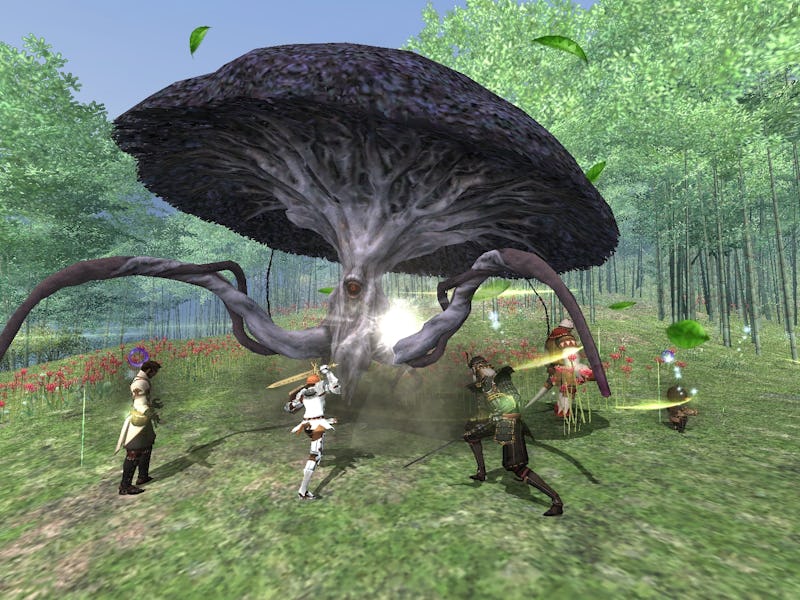Final Fantasy XI Changed What an MMO Could Be
It’s dangerous to go alone.

Before Eorzea, there was Vana’diel.
Final Fantasy XIV is one of the most popular MMORPGs in the world with over 1 million daily players, but it might not if it weren’t for Final Fantasy XI, which came to North America on October 28, 2003. Square Enix’s first foray into MMOs came before World of Warcraft transformed the genre. And playing it today, it’s clear the game operates with a totally different toolkit from modern games.
Even Final Fantasy XIV pays tribute to its scrappier older sibling from time to time with a recurring event that brings a character from Final Fantasy XI into Eorzea. With the launch of Dawntrail, we’ll see a much more significant crossover as the Echoes of Vana’diel Raid series introduces an entire questline based on the older MMO.
The Maiden’s Rhapsody event brings a character from Final Fantasy XI into Final Fantasy XIV.
To put things into perspective, Final Fantasy XI released when only around 664 million people around the world had access to the internet, according to Our World in Data, compared to more than 2 billion at Final Fantasy XIV’s launch. Online console games were still in their infancy, and Final Fantasy XI was the first game to allow PC and console players to play together.
But Final Fantasy XI is more than an artifact of note for Final Fantasy XIV players. Final Fantasy XI received its last expansion in 2020, and it had been five years since the previous one at that point. Despite that, the 21-year-old game still has plenty of dedicated fans (the website MMO Populations estimates it has around 14,000 daily players at the time of this writing). And there are no plans to shut down servers, even after Square Enix announced an end to major updates earlier this year.
While some players may hang on for nostalgia’s sake, there’s clearly more to the game than that. Final Fantasy XI stood out at launch by focusing much more on its story than other popular MMOs of the era like Everquest and RuneScape. Final Fantasy games have always put their stories first, but bringing that to an online game was revolutionary.
“We want to create a world that has a feeling of continuity, premised on a culture and society that is constructed in participation with the players,” executive producer Hiromichi Tanaka said in a 2002 interview for the game’s launch in Japan, shared by shmupulations, a site that translates old interviews from out-of-print Japanese magazines.
As opposed to Final Fantasy XIV, which you can explore largely as a single-player game, Final Fantasy XI forces players to cooperate at every turn. While later updates let players fly solo far more, the game was impossible to play alone at launch.
Final Fantasy XI is full of challenges too great to tackle alone.
In a paper presented at the Meaningful Play 2018 conference, researcher Nicolas Lalone argues that making social interaction and cooperation necessary for players to advance helped prevent a toxic culture from taking hold. But as World of Warcraft became more popular and added features making interactions both less necessary and more automated (like the Dungeon Finder, which let players form groups without the need to communicate), Final Fantasy XI followed suit and made solo play more viable to account for a lack of new players. By the time Final Fantasy XIV came around, a philosophy that encouraged solo play was already baked into its design.
Despite Final Fantasy XI adapting to a solo-friendly experience, it’s still far from a typical MMO. The world of Vana’diel is hostile to a degree that most modern MMOs aren’t. Final Fantasy XI is packed with systems, from its difficult content to side activities like Chocobo breeding, and players are mostly left to figure it out all on their own.
And though the necessity to work with other players has been reduced, Final Fantasy XI is ultimately still a game built with its community in mind. It’s fostered a welcoming player base as a result, something that Final Fantasy XIV also achieved. Maybe more than anything else, that’s why some players still cling to Final Fantasy XI even 21 years later.
“I'm not aware of whether FFXI contributed anything that stood out compared to other MMORPGs,” producer Akihiko Matsui told Gamespot in 2022. “But if I had to name something, I'd say that it brought Final Fantasy to MMORPGs; in other words, it established a style of games that strongly emphasizes narrative, and includes cutscenes (dramatic scenes) as part of the experience even if they make other players wait for the game to start.”
Final Fantasy XI’s focus on story and community carry over into Final Fantasy XIV.
That humble response aside, Final Fantasy XI paved the way for Final Fantasy XIV’s even greater focus on story. Shades of Final Fantasy XI can even be seen in Final Fantasy XII. The most obvious is the Gambit system, which allows players to set an AI routine for companions, offering a taste of the feeling of controlling one character in a party of other players. Hunt quests, which challenge players to track down specific, powerful monsters for rewards, also mirror Notorious Monsters in Final Fantasy XI, which spawned under particular conditions and offered greater rewards than typical foes.
But what makes Final Fantasy XI special isn’t its influence on other games — it’s how it stands on its own. Final Fantasy XI has one foot in old-school MMOs, with their focus on grinding and player-driven worlds, while introducing a story that’s been unmatched by anything except Final Fantasy XIV.
Final Fantasy XI may be past its prime, but it remains an online world unlike any other. With the Echoes of Vana’diel event bringing it back into the conversation, maybe there’s even a chance for it to shine again.
This article was originally published on